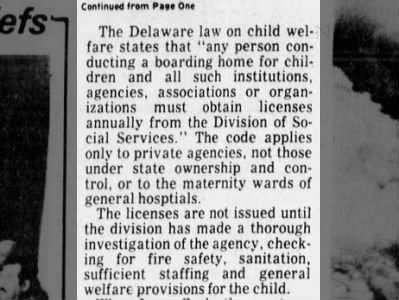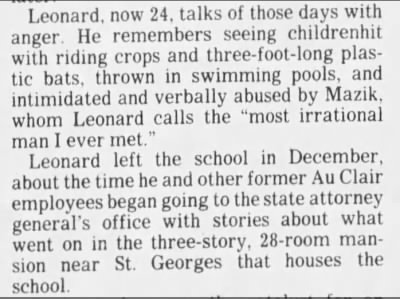By most accounts, Mazik attorney, Vincent Rammuno hit a homerun when he called out the state on its failure to perform its duties in the licensing of Au Clair. It wasn't just a deflection point.
On November 4, 1978, The News Journal ran a story airing the state's failure to maintain licensing practices from 1975 to 1978. The Division of Social Services clearly owned its fault in falling far short of the law with its inability to provide annual licenses to private residential care facilities for children, placement agencies and group homes. The fall-out of these violations had extended to each of the 28 agencies under the purview of the department, putting each facility in tenuous position of operating outside the law, impeding their ability to acquire malpractice insurance, and for some, hindering the ability to receive national accreditations or outside funding.
One facility operator put it this way, "It was a dangerous period for the state and for the consumer - which in this case, the consumer being the child."
By the time the story made headlines, the Division was taking its own corrective action - after realizing its failure put at risk thousands of dollars in federal funds meant to support 150 children who were then placed in these private facilities.

Was it possible that the State was at fault for the deficiencies at Au Clair? On July 25, 1979, the News Journal delved into the ramifications of the state's lapse in licensing at Au Clair. It's license had expired September 15, 1976. During its investigation, the News Journal claimed that at least one report of child abuse in May 1978 had been improperly handled because no licensing staff existed at the time.
Writers pondered whether more instances of abuse would have been uncovered had the school been monitored in the years it operated without state oversight. It was during these years that former and current staff believed that conditions at Au Clair were most critical.
On July 22, 1979, the News Journal ran another story on Au Clair, highlighting the concerns of current and former staff members who had been at Au Clair during the years it was without a license. Some spoke publicly, other asked to have their identity concealed.
 One such staff member was hired into the school in 1977. He witnessed children being hit with riding crops and a three-foot-long whiffle ball bat. Another staff member, hired in August 1976, on his second day, witnessed a teen who was tied with a rope around the waist and then dunked into a pool "that had not been cleaned, and it was filled with algae, dirty water, and dead insects."
One such staff member was hired into the school in 1977. He witnessed children being hit with riding crops and a three-foot-long whiffle ball bat. Another staff member, hired in August 1976, on his second day, witnessed a teen who was tied with a rope around the waist and then dunked into a pool "that had not been cleaned, and it was filled with algae, dirty water, and dead insects."In 1976, Mazik did admit to using a riding crop on a student. He described the incident as "a long time coming." He justified whipping the 16 year old b/c he " was feeling his manhood" and had begun obsessing about sex. Suffice to say, he beat the boy's manhood right out of him. And then there was "Pete's Room." The room, used at night, had four beds and frequently housed up to six children. The window in the room was enclosed in a wire cage and the door could be shut and locked. Staff members were concerned not by the overcrowding, but by the unventilated room temperature which could rise to 95 degrees in the during the summer.
Questions were also raised about the three states that sent children to Au Clair for private placement. How much or how little oversight had these states provided when choosing to send students to a facility without a license.
- The State of New York had proactively removed Au Clair from its list of approved facilities in 1978 when the school refused to provide enough financial data for the state to justify the cost of care. Au Clair was charging New York $18,000 year per year per child. In 1979, the only New York students at Au Clair were those who were privately placed by their own guardians.
- Officials from Massachusetts admitted its last visit to the school was in 1974.
- The State of Maryland had made scheduled visits to Au Clair to check on its 8-9 students in residence, however Mazik would not allow surprise inspections. Maryland would continue to send students to Au Clair/AdvoServ until 2016 when inspectors found deplorable conditions that caused them to sever the contract with the school.
What Au Clair taught Delaware was that it was time to rewrite the state's licensing regulations.






0 comments:
Post a Comment
Word Verification May Be Case Sensitive